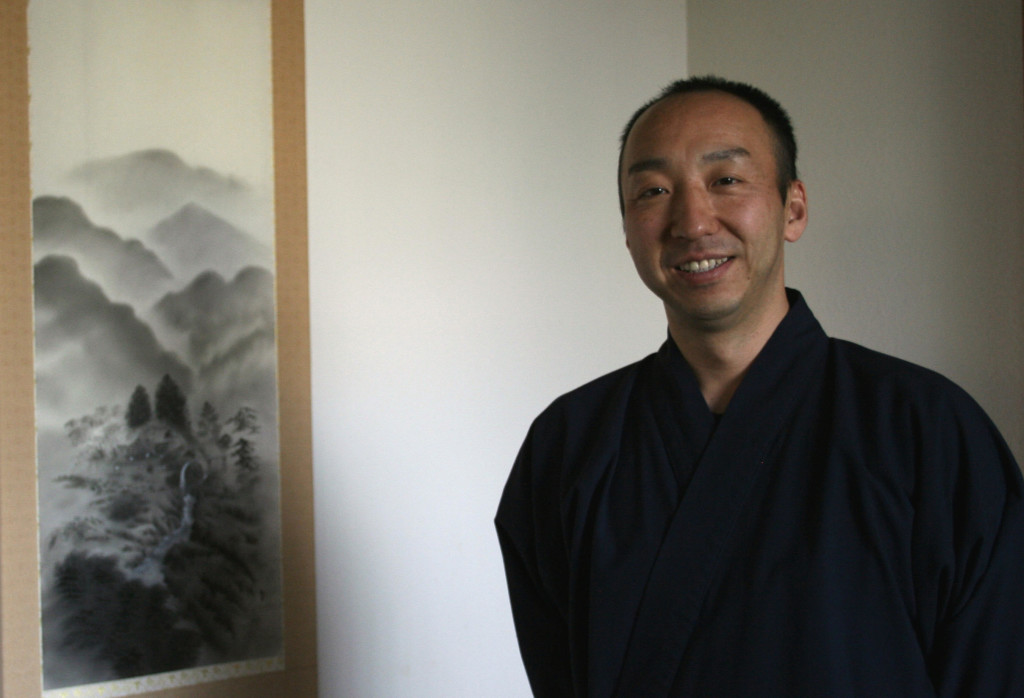“I was born and raised in a temple family, which means my father is also a Buddhist minister, and so was my grandfather. In fact, my father is the 16th generation of resident ministers in my family. This is a Japanese tradition, the son takes over the father’s place. My family’s temple has been run by my family for more than 350 years. So that is one reason why I became a Buddhist minister. First, I wanted to be a school teacher. I went to University and majored in primary education. After I finished school, I took a leave of absence to join a volunteer program. I went to Zimbabwe to teach baseball for about two years. After I came back from Zimbabwe, I became an elementary school teacher. Eventually, I moved to the United States and started working as a minister.”
“As a child, I disliked the Buddhist temple because as the minister’s child I was forced to attend the gathering for kids on Saturday nights. On Saturday nights there were so many interesting TV programs, and when I came to school on Mondays, my friends all talked about Saturday’s TV programs, which I couldn’t watch – that was really stressful. I also loved baseball and had a dream of becoming a professional baseball player. When I was young, I didn’t study Buddhism. I thought it was something mystical. In Japan there are so many memorial services, so I believed Buddhism was just for the memorial services. But when I actually started studying Buddhism in my 20s, something changed. It helped me understand who I am. The more I studied Buddha’s teachings, the more I understood myself. That was a turning point for me.”
“For me, it is helpful to be married. My wife helps me understand Buddhism better. I have to give a Dharma talk every Sunday, and after the service most of my members will be polite and tell me that it was a good talk, even if they didn’t understand it. But my wife will give me a direct and honest response. If she didn’t understand something, she will tell me right away. She makes me study Buddhism more. I think the Buddhist path or life is to understand your ego – greed, anger, ignorance and attachment. When I lived by myself, I was more selfish. But now that I am living with my wife in the same house, it means that I cannot be selfish. I have to think about the other person. She is like a mirror.”
“In the mornings, I chant Sutra in front of Amithaba Buddha. There are many reasons to chant Sutra. While chanting, I am not thinking about anything but the Sutra, which means that during this time my mind is free from modern society. I don’t have to worry about my mail or my schedule. Chanting also means I am reading Shakyamuni Buddha’s words, meaning his words are coming out of my mouth. It is pure. But Buddhist practice is 24 hours a day, 7 days a week. The Buddha’s teachings are not only in the book. You can learn Buddhism from your wife, kids, at the restaurant, everywhere. Actually, living my life is my practice.”
“Of course I get angry sometimes. When this happens, I usually try to get some sleep. The next morning, my anger is gone. When arguing, your mind is filled with anger, so there is no space to think about the other person. You just think that I am right and the other person is wrong. That’s why I take some time to calm down, and for me the best way to do that is to sleep. If I cannot sleep, I try to make time to be quiet. After I calm down, I can rethink the situation.”
“Death is very sad and a big turning point in our lives because we cannot physically see each other anymore. This can be very difficult. But in the Buddhist thinking, death is not the end of our life. We will be reborn. We can still have a connection with the person that died. It is a sad occasion, but we need to cherish it. Being confronted with death is a precious opportunity to think about your life. Death teaches us that our life is impermanent.”
“I like the Jodo Shinshu tradition I practice, but everybody has a different path and that is perfectly okay. We have to understand each other. That is a key point in this modern world. It saves us from ignorance. Not knowing other religions, cultures, customs is a cause of conflict or fighting. We need to understand and respect each other. As a famous Japanese poet once said: Everybody is different, everybody is good.”


